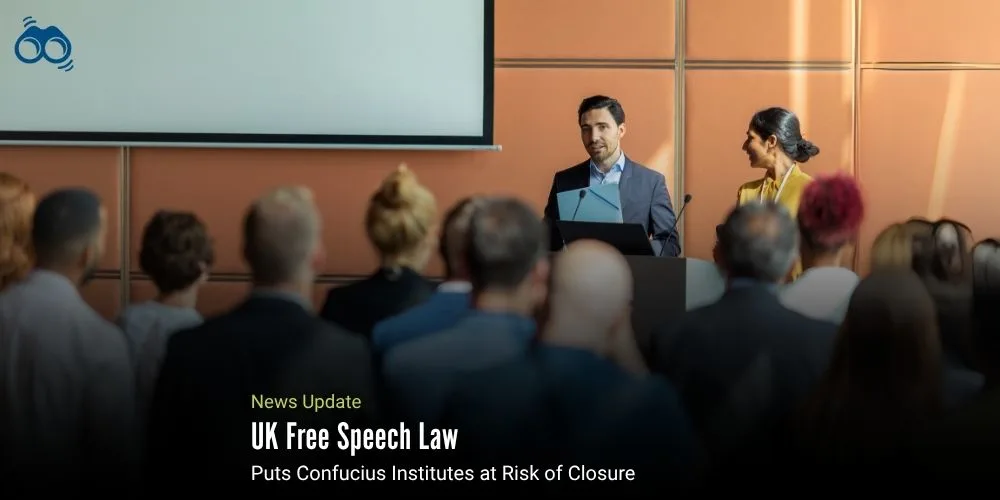Balancing Culture and Compliance: The Future of Confucius Institutes in England
New OfS Regulations Cast Uncertainty Over Confucius Institute Partnerships
In light of recent regulatory reforms, Confucius Institutes hosted by universities across England are facing heightened uncertainty regarding their continued operation. This development follows the introduction of strengthened free speech rules by the Office for Students (OfS), which has prompted urgent discussions among government ministers, university leaders, and regulatory authorities.
As a result, these Chinese-funded language and cultural centres, long embedded within UK higher education institutions, are now under scrutiny. Stakeholders are actively assessing whether the institutions’ presence aligns with the new legal obligations to uphold academic freedom and lawful expression. Consequently, broader concerns have emerged surrounding transparency, foreign influence, and institutional accountability in the context of international partnerships. University officials have expressed apprehension that the revised guidelines may strain existing agreements with their Chinese counterparts, including the Beijing government. Moreover, they have raised questions about whether current arrangements, particularly those involving the vetting of staff by foreign governments, would now be deemed non-compliant under the updated rules. Notably, the OfS has yet to provide definitive clarification on this matter.
Currently, 20 Confucius Institutes operate across England in institutions such as the University of Manchester, Coventry University, and the University of Liverpool. These centres function as joint partnerships involving each university, a Chinese university, and a Chinese state-affiliated funding body. While their primary focus is on Mandarin language instruction and cultural programming, critics have alleged that the institutes may serve as covert channels of influence within UK academia.
In response to these concerns, the Department for Education (DfE) affirmed its support for diverse international collaborations in higher education, provided such partnerships comply fully with British laws and regulations. The department emphasised that it is incumbent upon each institution to determine whether existing agreements might restrict freedom of speech and to take corrective action where necessary. Furthermore, Skills Minister Jacqui Smith reiterated the government’s commitment to preserving universities as spaces for open and robust debate. She asserted that any attempt by a foreign power to harass or intimidate individuals within the UK would not be tolerated, citing existing safeguards under the National Security Act. Smith also noted that the government is working closely with the OfS to assist universities in upholding free speech and addressing harassment on campuses. The Chinese embassy in London reportedly declined to comment.
According to recent developments, universities may be compelled to revise their agreements with Confucius Institutes or risk penalties for breaching the OfS’s updated regulations. These rules specifically target institutions found to be associated with foreign-funded bodies that impose ideological conditions on employment. The campaign group UK-China Transparency has alleged that Chinese applicants seeking employment within Confucius Institutes have, in some instances, been required to disclose their political beliefs and undergo screening by a committee affiliated with China’s Communist Party. Such practices could contravene the OfS’s regulations, which explicitly prohibit ideological vetting.
An OfS spokesperson clarified that universities entering agreements with foreign entities must continue to uphold legal standards of free speech and academic freedom. Where such conditions cannot be maintained, institutions are urged to amend or withdraw from the arrangements. The spokesperson further stressed that any ideological test used as a condition for employment is unacceptable under the guidance. While many universities have refrained from issuing public statements, several leaders have confirmed that they are actively seeking clarification and requesting additional time from the OfS to evaluate the implications of the new guidance. One unnamed university expressed concern over the lack of specificity, noting that the OfS had not identified which arrangements would be considered compliant.
The OfS reiterated that institutions failing to meet their free speech obligations must take immediate corrective measures. Meanwhile, Lancaster University affirmed its commitment to protecting freedom of expression for both students and staff, and stated that it is reviewing the potential impact of the revised guidance on its Confucius Institute, which it described as a valued component of its internationally diverse academic environment. A spokesperson for Universities UK added that institutions across the sector remain committed to defending free speech and academic liberty. They acknowledged the legal responsibilities imposed by the OfS and highlighted the broader economic and societal benefits derived from global educational partnerships. As universities navigate this complex regulatory landscape, the future of Confucius Institutes in England remains uncertain, pending further clarification and institutional review.
Editor’s Note:
The growing scrutiny of Confucius Institutes in England, following the Office for Students’ new free speech rules, represents an important moment for how universities are managed. These institutes, which have long been seen as promoting cultural exchange, are now being closely examined to see whether they meet universities’ values and legal duties. As institutions respond to these changes, the situation highlights the ongoing challenge of balancing international cooperation with the protection of academic freedom. This report looks at how new regulations are shaping the decisions that UK universities must make. It shows the difficulties involved in keeping global partnerships while following stricter rules.
Skoobuzz believes that these developments underscore the critical importance of openness, political neutrality, and free speech in preserving trust and independence within higher education.














0 Comments (Please Login To Continue)